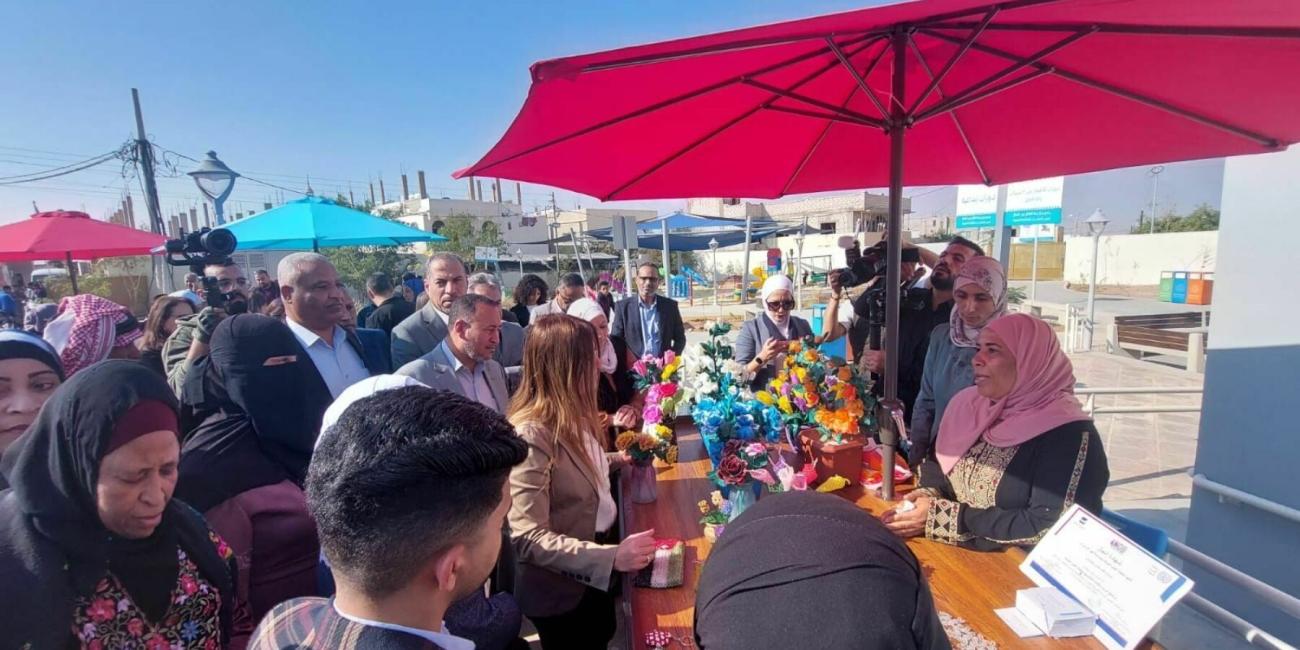UNOPS empowers women through safe public spaces

The rehabilitated facilities will directly benefit more than 37,000 inhabitants in Ghor Al Safi – 46 per cent of whom are women.
In the Southern Jordan Valley, improved access to safe and inclusive public spaces is supporting innovation and helping create livelihood opportunities for vulnerable women.
The COVID-19 pandemic resulted in unprecedented social and economic shocks across Jordan. The crisis response led to economic vulnerabilities, food insecurities and increased unpaid domestic work, especially among women.
With funding from the UN COVID-19 Response and Recovery Multi-Partner Trust Fund, UNOPS, UN-Habitat and the International Labour Organization (ILO) joined hands to help empower vulnerable and marginalized people living in Ghor Al Safi.
“The COVID-19 pandemic has negatively impacted women and vulnerable groups across Jordan, including the Southern Jordan Valley,” said Muhammad Usman Akram, Director of UNOPS Multi-Country Office in Amman.
“We are proud of our partnership with UN-Habitat and ILO to help communities in the Ghor Al Safi area, which is in dire need of a safe space for women, youth, children and vulnerable people,” he added.
Implemented in partnership with the Zaha Cultural Centre, the Municipality of the Southern Jordan Valley and the Jordan River Foundation, the project is helping enhance socio-economic conditions and creating livelihood opportunities for vulnerable women through the rehabilitation of a community centre and a safe and green public space.
Rehabilitated by UNOPS, the park now includes safe play and rest areas for children of all ages, including children living with disabilities. Areas have also been designated for social and cultural activities, including a market space that will serve as a platform for the creation of livelihood opportunities for vulnerable women.
The community centre within the park will host social, cultural and capacity-building activities, including tailored training seminars on entrepreneurial skills to help increase the employability of women in the area.
At the inauguration ceremony held in December 2022, Frida Khan, the Country Coordinator for the ILO office, praised the transformation: “This place is buzzing with life and hope.”


The rehabilitated facilities will directly benefit more than 37,000 inhabitants in Ghor Al Safi – 46 per cent of whom are women – as well as those from neighbouring communities. At least 26,000 inhabitants in neighbouring areas of El-Mazraa, Al-Maamoura and Ghor Fifa – which lack access to adequate and safe public spaces – will also indirectly benefit from the improved infrastructure.
“This project builds on the extensive and worldwide experience of UN-Habitat in improving public space as a catalyst for developing sustainable and resilient livelihoods through nurturing social cohesion between hosts and displaced communities,” said Deema Abu Thiab, the National Programme Coordinator for UN-Habitat.
"This project has been an excellent example of combining the expertise of different agencies and different types of support, soft and hard," said Frida Khan, ILO’s Country Coordinator to Jordan
“Without UN-Habitat and UNOPS intervention, we would have had a cohort of entrepreneurs without a space from which to use their skills and market their products. And without ILO’s support, the other agencies would have had a world-class community space but underutilized to its full potential as a hub for women’s social and economic empowerment,” said Frida Khan. “Now we have both.”
The public area, which is expected to receive at least 10,000 visitors a year, provides a safe space for women to develop and promote their small businesses. Around 15 market fairs and 3 annual festivals will be organized to attract people visiting Wadi Hasa, which is a landmark tourist site located on the outskirts of Ghor Al Safi. The additional visitors will help create economic opportunities for women business owners in Ghor Al Safi to promote and sell their products.
About the project
This project is funded by the UN COVID-19 Response and Recovery Multi-Partner Trust Fund. UNOPS implemented the project in partnership with UN-Habitat and the International Labour Organization. Considered the first of its kind in the area, the project followed an integrated approach developed by UN-Habitat to strengthen the community’s involvement in the design, implementation and maintenance of the space. Consultations were held in Ghor Al Safi with local community members and organizations, with perceptions related to gender, safety, accessibility and inclusivity considered in the design of the new space.


